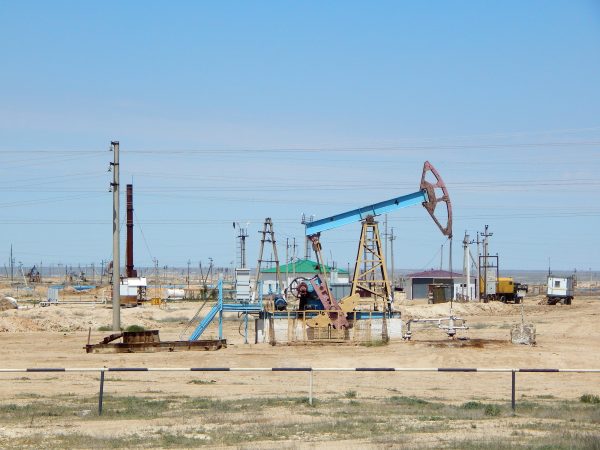After the Russian authorities began a conflict in Ukraine in late February, an oil pipeline got here into the highlight. With sanctions looming, producers, shareholders, and merchants linked to the Caspian Pipeline Consortium (CPC) that pumps oil from Kazakhstan to international prospects within the West turned cautious of a possible backlash. This week, inclement climate and ongoing repairs at its services additional doomed the pipeline’s future, at the least within the brief time period.
On March 24, Nikolai Gorban, the final director of the CPC, stated that the corporate would halt loading at their marine terminal at Novorossiysk, a Russian port on the Black Sea.
On the identical day, Kazakh Power Minister Bolat Akchukalov stated {that a} potential rerouting away from CPC could be “troublesome to perform rapidly.”
Days earlier, the CPC introduced the necessity for repairs of its infrastructure, which was broken throughout a storm, and the momentary decommissioning of one in every of its mooring constructions.
Operating 1,500 km from the northwestern Atyrau province in Kazakhstan throughout southern Russia, the CPC has a every day capability of 1.4 million barrels, about 2.5 % of world seaborne oil commerce. It was expanded via gigantic investments over the previous decade.
When it was first inbuilt 2001, the CPC represented the primary viable outlet for Kazakhstan’s oil outdoors the Soviet-era infrastructure (discounting the occasional oil swaps with Iran). Now, it transports two-thirds of Kazakhstan’s oil exports. That’s round 40 % of Kazakhstan’s complete exports. For the reason that early 2000s, Kazakhstan has additionally constructed a significant pipeline to China, however the bulk of the oil extracted in its western fields of Tengiz, Karachaganak, and Kashagan, together with different smaller fields, feeds the CPC.
Importantly, this establishes a connection between pipeline possession and oil exports.
Actually, U.S. company Chevron owns a 50 % stake within the Tengizchevroil enterprise that exploits Tengiz, an 18 % share within the Netherlands-based Karachaganak Petroleum Working BV (KPO) consortium that extracts gasoline and condensate at Karachaganak, and a 15 % stake in CPC, by way of a subsidiary registered in Almaty, Kazakhstan’s so-called enterprise capital.
Texas-based ExxonMobil’s funding community in Kazakhstan can also be complicated: Delaware-registered ExxonMobil Kazakhstan Ventures owns a 25 % stake in Tengizchevroil, whereas Mobil CPC, registered on the similar handle, owns 7.5 % of CPC; Bahamas-registered ExxonMobil Kazakhstan Inc. owns 16.8 % in NCOC NV, the Netherlands-registered consortium answerable for the Kashagan offshore area.
Italy’s ENI additionally owns a 16.8 % stake in Kashagan, via the Netherlands-based subsidiary Agip Caspian Sea BV, and a 29.25 % share in KPO (by way of Agip Karachaganak BV, additionally positioned in Amsterdam). As well as, it owns a 2 % share within the CPC by way of a Luxembourg-registered subsidiary (Eni Worldwide NA).
Headquartered in London, Shell controls a 16.8 % share within the Kashagan consortium (by way of Netherlands-based Shell Kazakhstan Improvement BV), in addition to a 29.25 % in KPO. Shell additionally owns 49 % in Rosneft-Shell Caspian Ventures Restricted, a Cyprus-registered firm, majority-owned by the Russian state-controlled oil enterprise. The enterprise owns a 7.5 % stake in CPC.
The Russian state-owned hydrocarbon transport monopolist Transneft owns a 24 % stake in CPC. Russia’s state-controlled oil enterprise Rosneft – in a three way partnership with Shell – owns a further 7.5 % share.
Given the Russian participation within the CPC shareholding construction, as soon as the Kremlin launched its navy offensive towards Ukraine, and several other Western nations responded with sanctions, merchants turned cautious of shopping for oil from the CPC, because it might turn into topic to sanctions.
On March 18, the U.S. Treasury Division informed oil merchants to “train warning if they’ve a cause to consider such certificates [provided by the CPC ensuring that their oil is not of Russian origin] has been falsified.” In an earlier notice, the Treasury Division had given a inexperienced mild to CPC oil, because the pipeline might successfully segregate Russian oil, underneath U.S. sanctions as a result of conflict in Ukraine.
Traditionally, round 8 % of the oil transported by way of the CPC originates from Russia.
The conflict might additionally have an effect on oil pumped by way of the CPC from Karachaganak, because the KPO consortium additionally options Russia’s non-public oil firm Lukoil, which owns a 13.5 % stake by way of Netherlands-registered LUKOIL Abroad Karachaganak BV. By the three way partnership LukArco, Lukoil additionally owns a 5 % stake in Tengizchevroil and a 12.5 % stake within the CPC. Whereas the consequences of sanctions on privately-owned Lukoil are troublesome to foretell, oil extracted and bought by Russian shareholders might turn into more and more poisonous for the market.
The potential disruption to the CPC might final wherever between a number of weeks and two months and lower output by round 1 million barrels per day, successfully incapacitating a significant export route for Kazakhstan.
“Russia could make it very troublesome for repairs to happen given the challenges it’s at present dealing with to promote its personal oil,” Amrita Sen, chief oil analyst at Power Facets informed the FT. But, Groban, the CPC director, informed Reuters that “overseas suppliers have stopped deliveries of spare elements for the broken services,” presumably attributable to sanctions, which might stretch the interval of restore.
Ought to the dwindling oil throughput final past a important level, extractive firms working in Kazakhstan will scramble to seek out different choices, not a straightforward job on condition that Kazakhstan is a landlocked nation and most of its export routes undergo Russia.

